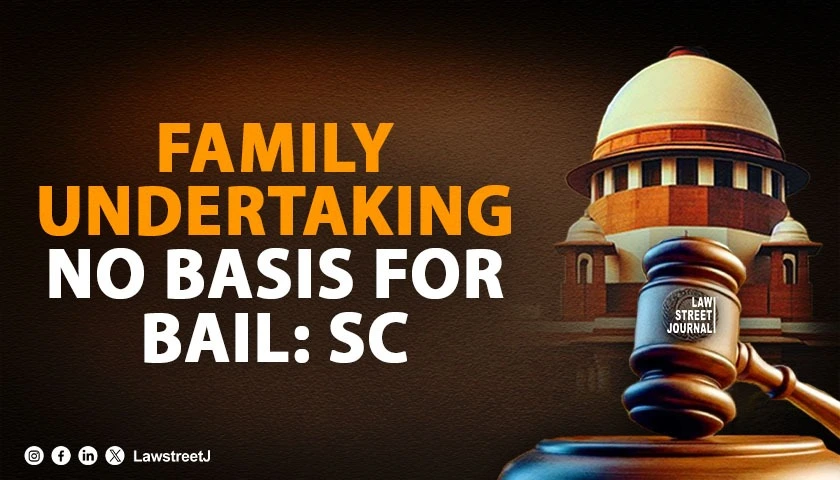New Delhi: The Supreme Court has held that an undertaking by a family member to ensure an accused’s compliance with bail conditions is of no relevance, observing that if the accused were to abscond, family members cannot be sent to prison as “the alleged sins of an accused cannot be visited on his brother or other family members” in India.
Justice Manmohan, writing for a two-judge Bench also comprising Justice N.V. Anjaria, set aside the High Court’s bail order in a case involving the recovery of over 731 kilograms of ganja, emphasizing that serious allegations of organised drug trafficking cannot be overlooked despite an undertaking from the accused’s brother, a serving Indian Army Sepoy.
The Court was dealing with a Criminal Appeal arising from SLP (Crl.) No. 9792/2025 filed by the Union of India challenging the judgment dated March 11, 2025, of the Andhra Pradesh High Court at Amaravati, which had granted bail to Namdeo Ashruba Nakade in S.C. No. 144 of 2024 for offences under Section 8(c) read with Sections 20, 28, and 29 of the NDPS Act, 1985.
The case involved the recovery of 731.075 kilograms of ganja, valued at ₹2.91 crore (constituting commercial quantity under the NDPS Act), from a lorry being driven and owned by the respondent. The crime was detected on November 7, 2023, and the chargesheet was filed on May 3, 2024.
The High Court granted bail after the accused had been in custody for one year and four months, holding that investigative requirements were complete as the chargesheet had been filed, the trial was unlikely to commence soon, and the accused’s availability had been assured by his elder brother, a serving Sepoy in the Indian Army.
The High Court noted that the accused’s brother, Sri Mhatardeo Ashruba Nakade, appeared online during the bail hearing and affirmed his undertaking affidavit dated January 1, 2025. He submitted his service certificate, Aadhaar card, and identity card, and stated that he had “full control over his brother/accused and is capable of producing him before the court concerned as and when directed.”
Additionally, the accused offered to make his real-time location available through mobile phone pairing with the investigating officer’s device round the clock, relying on Puranmal Jat v. State of Rajasthan.
The Additional Solicitor General argued that the High Court failed to provide justification for waiving the mandatory conditions under Section 37 of the NDPS Act, relying on Narcotics Control Bureau v. Kashif (2024 SCC OnLine SC 3848), which held that “negation of bail is the rule and its grant is an exception” in NDPS cases.
Justice Manmohan highlighted the global drug crisis, noting that the United Nations Office on Drugs and Crime reported in its 2025 World Drug Report that “as at 2023, some 316 million people worldwide had used drugs in the past year, representing an increase over the past decade that outpaces population growth.”
The Court referenced studies indicating a troubling rise in drug abuse among Indian youth, observing that “substance abuse not only affects individuals, families, and communities but also undermines physical, social, political, cultural, and mental well-being.”
Justice Manmohan further cited Ankush Vipan Kapoor v. National Investigation Agency (2025) 5 SCC 155, which observed: “The ills of drug abuse seem to be shadowing the length and breadth of our country… The debilitating impact of drug trade and drug abuse is an immediate and serious concern for India.”
On constitutional mandates, the Court noted that Article 47 of the Constitution obligates the State to improve public health and prohibits consumption of intoxicating drugs except for medicinal purposes.
On the facts, Justice Manmohan held:
“Though the respondent-accused was in custody for one year and four months and charges have not been framed, the allegations are serious—recovery far exceeds the commercial quantity threshold, and the respondent-accused allegedly had cavities ingeniously fabricated beneath the trailer to conceal the contraband.”
The Court found prima facie organised involvement:
“This Court is of the opinion that the respondent-accused is involved in drug trafficking in an organised manner. Consequently, no case for dispensing with the mandatory requirement of Section 37 of the NDPS Act is made out.”
On the custody argument, the Court held:
“As the accused has been charged with offences punishable with ten to twenty years’ rigorous imprisonment, it cannot be said that the respondent has been incarcerated for an unreasonably long period.”
Most significantly, on the brother’s undertaking, the Court categorically rejected this ground:
“The respondent-accused’s contention that his brother, a Sepoy in the Indian Army, has given an undertaking to ensure compliance with bail conditions is of no relevance, because if the respondent were to abscond, his brother cannot be sent to prison. In India, the alleged sins of an accused cannot be visited on his brother or other family members.”
The Supreme Court allowed the appeal, set aside the High Court’s order, and directed the respondent-accused to surrender within two weeks.
Mr. S.D. Sanjay, Additional Solicitor General, appeared for the Union of India, while Mr. Dilip Annasaheb Taur appeared for the respondent.
Case Title: Union of India vs. Namdeo Ashruba Nakade











